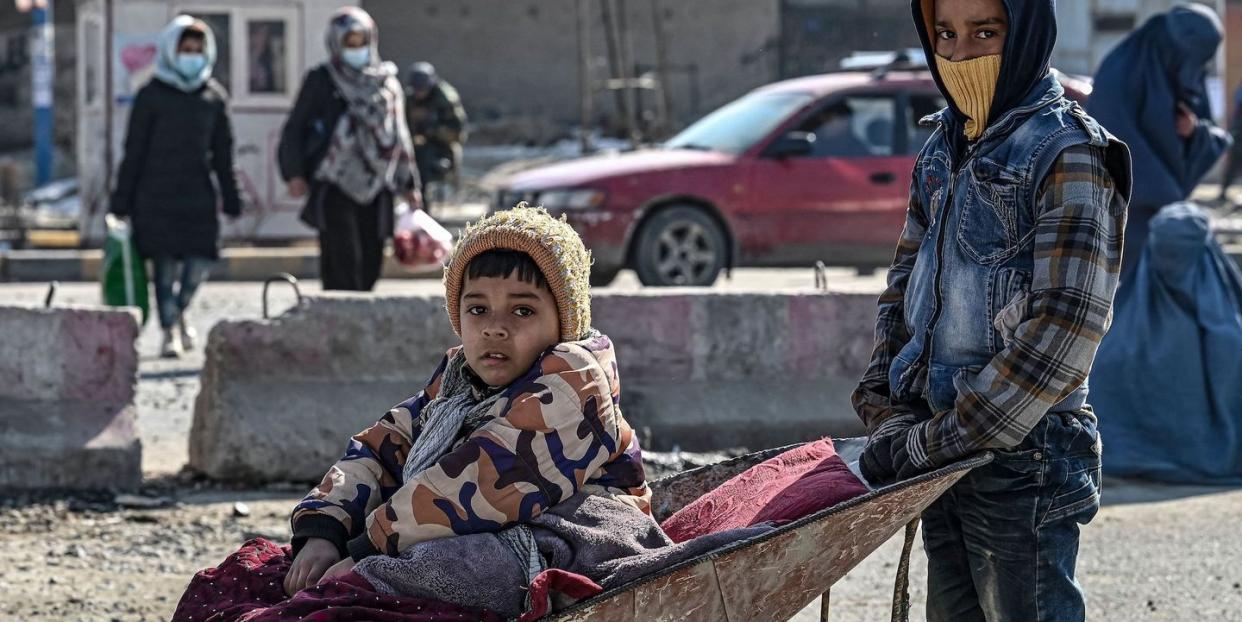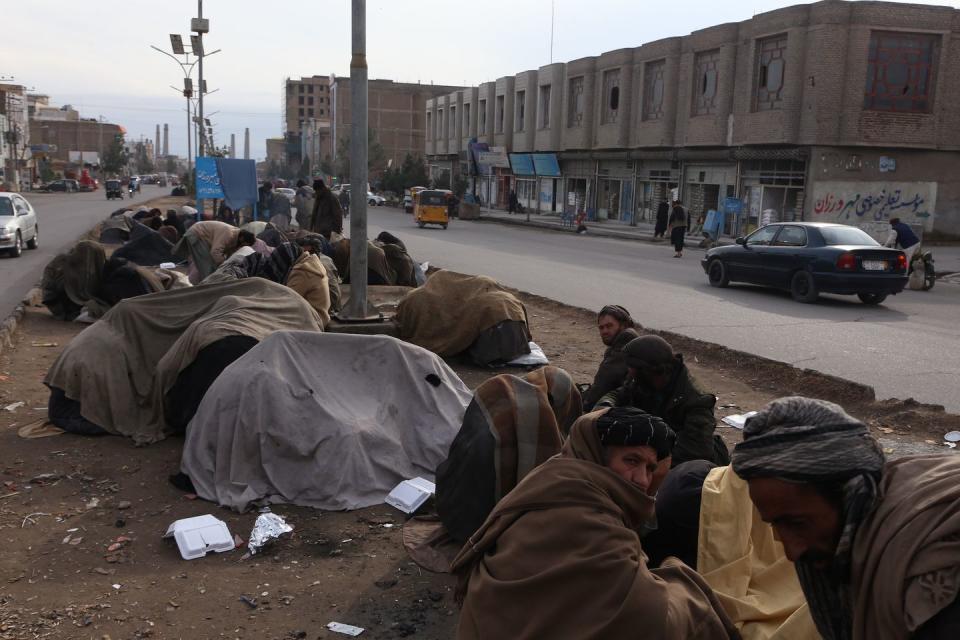We Don't Care That Afghans Are Starving Because the Outrage Was Always About American Humiliation

Like most Americans, I rarely thought about Afghanistan day-to-day even while my own country was occupying it. In fairness, when that's the state of affairs from the time you're 10 years old it kind of cuts into the novelty of it all. But the more basic fact in play was that only one or three percent of the United States population was truly at war, the rest of us ensconced in late-imperial decadence an ocean—and half the Eurasian continent—away. You would often hear even less about Afghanistan in the news than you would Iraq, particularly after the rise of ISIS.
Afghanistan did become a subject of interest to a larger swathe of Americans last year when President Joe Biden finally followed through on the promises of the last three presidents—himself among them—and withdrew the remaining U.S. forces there. It was a messy exit, complete with footage reminiscent of Americans fleeing Saigon under similar circumstances as well as a deadly terrorist attack outside the Kabul airport. (There was also the U.S. retribution for that attack, a drone strike the military at first claimed killed a terrorist combatant only for it to soon emerge that the Hellfire missile had killed a civilian man and his family when it crashed into their courtyard.) Op-eds began to surface lamenting (quite rightly) the plight of Afghanistan's women and girls, who were sure to be stripped of true membership in civil society by the incoming Taliban regime. But now, a few months later, most of us are back to not caring about Afghanistan.
The proof, or part of it, lies with a Washington Post story that passed peacefully into the news ether earlier this week.
The country’s new rulers, cut off from most international aid as well as Afghan government assets held in U.S. accounts, have scant resources to protect millions of vulnerable people against another harsh winter. Aid groups estimate that nearly 23 million Afghans, out of a total population of 39 million, already do not have enough to eat. Many also lack solid shelter and money to heat their homes at night, forcing them to choose between food and fuel, and creating additional potential for a full-fledged humanitarian disaster, aid officials said.
Many Afghans were living a meager existence before the Taliban’s takeover. But others are part of a large, newly impoverished urban working class that mushroomed after the sudden collapse of the vast, foreign-funded war and aid economy.
Close to 60 percent of the citizens in a country where the United States was recently in charge are on the brink. Many of them, we can safely assume, are the same women and girls that American pundits rightly feared would be stripped of an education and made subservient to the male population. But when those women are stripped of the most basic building blocks of life, few Americans seem to care. 40 House Democrats have called on Biden's Treasury Department to hand over the cash we're keeping from the Taliban in the interest of saving Afghan lives. (The administration froze the $9.4 billion in assets, and has refused to recognize the Taliban government, until the regime forms an "inclusive" government, guarantees women and minority rights, and severs all ties with terrorist groups. Are we going to wait out the winter in another contest of cruelty with ruthless opponents?) But for the most part, there's been little-to-no acknowledgement that this is even going on.

It's giving us all too much credit to claim this is down to queasiness about forking over money to the Taliban. What this reveals about the widespread American outrage over our withdrawal is that it had very little to do with the Afghan people at all. To the extent that the outrage was genuine, it was not just filtered through an American prism, it was entirely contained within the American psyche, within our idea of America itself. It was spittle-flecked rage at the vision, blasted out through international media, of American humiliation. The withdrawal was a rubber stamp on what's long been obvious: the United States lost the war in Afghanistan, just like it lost Vietnam. At the very least, we were never going to win. All the vast power of American empire was brought to bear only for us to flee, tails between our legs, rushing our personnel out in B-52s. If the concern for Afghan women and girls does not extend to the prospect they will starve to death, it's enough to make you think it was never really about Afghan women and girls at all.
They weren't crocodile tears, though, they were tears of rage—the same rage at our national humiliation that, as Spencer Ackerman details in Reign of Terror, Donald Trump tapped into whenever he discussed our military quagmires. "We don't win anymore," he told a CPAC crowd even after he'd taken office. "When was the last time we won? Do we win a war? Do we win anything?" Nobody really cared that we weren't winning in Afghanistan so long as it was in the background, part of the furniture. But when this failure was laid bare not just before Americans, but before the world, it became unbearable, another symptom of national decline. And never, at any point, was it about the Afghans. Do we not bear responsibility for the welfare of these people, having crashed into their house 20 years ago and broken so much inside? We destabilized the Central American countries from which people are now fleeing, and then completely lose our shit when they arrive at our southern border, but there's at least a gap there of a few decades. We were in Afghanistan a few months ago! But in a truly Exceptional country, you don't have to think about anyone else except as they relate to you.
You Might Also Like

